| Listing 1 - 10 of 57 | << page >> |
Sort by
|
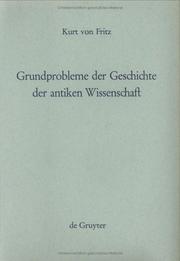
ISBN: 3110018055 1306276039 3110816776 9783110018059 Year: 1971 Publisher: Berlin de Gruyter
Abstract | Keywords | Export | Availability | Bookmark
 Loading...
Loading...Choose an application
- Reference Manager
- EndNote
- RefWorks (Direct export to RefWorks)
Science, Ancient --- Science, Ancient. --- Ancient science --- Science, Primitive --- Science --- History
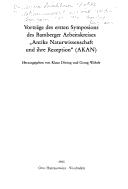
ISBN: 3447030712 9783447030717 Year: 1990 Volume: 21 Publisher: Wiesbaden : Otto Harrassowitz,
Abstract | Keywords | Export | Availability | Bookmark
 Loading...
Loading...Choose an application
- Reference Manager
- EndNote
- RefWorks (Direct export to RefWorks)
Science, Ancient --- Sciences anciennes --- Congresses --- Congrès --- Congresses. --- -Ancient science --- Science, Primitive --- Science --- History --- -Congresses --- Congrès --- Ancient science --- Science, Ancient - Congresses. --- Sciences antiques --- Influence --- Appréciation
Book
ISBN: 0709912099 9780709912095 Year: 1984 Publisher: London: Croom Helm,
Abstract | Keywords | Export | Availability | Bookmark
 Loading...
Loading...Choose an application
- Reference Manager
- EndNote
- RefWorks (Direct export to RefWorks)
Engineering --- Science, Medieval --- Science, Ancient --- History --- -Engineering --- -Science, Ancient --- Medieval science --- Ancient science --- Science, Primitive --- Science --- Construction --- Industrial arts --- Technology --- Engineering - Europe - History --- Engineering - Asia - History
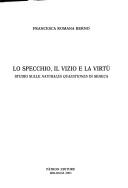
ISBN: 8855527231 9788855527231 Year: 2003 Volume: 79 Publisher: Bologna Pàtron.
Abstract | Keywords | Export | Availability | Bookmark
 Loading...
Loading...Choose an application
- Reference Manager
- EndNote
- RefWorks (Direct export to RefWorks)
Science, Ancient --- Meteorology --- Historiography. --- Ancient science --- Science, Primitive --- Science --- Aerology --- Earth sciences --- Atmosphere --- Historiography --- History --- Seneca, Lucius Annaeus, --- Atmospheric science --- Science, Ancient - Historiography. --- Meteorology - Historiography.
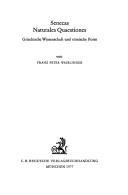
ISBN: 340605160X 9783406051609 Year: 1977 Volume: 70 Publisher: München Beck
Abstract | Keywords | Export | Availability | Bookmark
 Loading...
Loading...Choose an application
- Reference Manager
- EndNote
- RefWorks (Direct export to RefWorks)
Seneca, Lucius Annaeus, --- Science, Ancient --- Meteorology --- Historiography --- -Science, Ancient --- -Ancient science --- Science, Primitive --- Science --- Aerology --- Earth sciences --- Atmosphere --- History --- Seneca, Lucius Annaeus --- Historiography. --- -Historiography --- Sénèque --- Ancient science --- Atmospheric science --- Science, Ancient - Historiography --- Meteorology - Historiography --- Seneca, Lucius Annaeus, - approximately 4 BC-65 AD - Naturales quaestiones
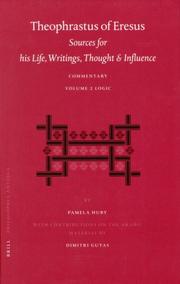
ISSN: 00791687 ISBN: 1281400300 9786611400309 9047410556 9789047410553 9789004152984 9004152989 9004111301 9004113177 9004101748 9789004194229 9789004142473 9789004268821 9789004101746 9004142479 9789004113176 9789004111301 9789004362277 Year: 1999 Volume: 64, 79, 81, 97, 103, 136, 149 Publisher: Leiden Brill
Abstract | Keywords | Export | Availability | Bookmark
 Loading...
Loading...Choose an application
- Reference Manager
- EndNote
- RefWorks (Direct export to RefWorks)
This volume forms part of the international Theophrastus project started by Brill in 1992 and edited by W.W. Fortenbaugh, P.M. Huby, R.W. Sharples and D. Gutas. Along with volumes containing texts and translations, the commentary volumes provide classicists and philosophers with an up-to-date collection of the material relating to Theophrastus (ca. 370-286 BC), Aristotle’s pupil and successor as head of the Peripatetic school. This is the second volume of Huby's commentary on Theophrastus of Eresus. Sources for His Life, Writings, Thought and Influence . Dimitri Gutas has written on the Arabic passages, including some unique material, and Pamela Huby has covered the rest. Theophrastus largely followed Aristotle’s logical views, but made important changes in modal logic, and dealt with hypothetical and prosleptic syllogisms. He also influenced medieval logic.
Philosophers --- Philosophy, Ancient --- Science, Ancient --- Ancient science --- Science, Primitive --- Science --- Ancient philosophy --- Greek philosophy --- Philosophy, Greek --- Philosophy, Roman --- Roman philosophy --- Scholars --- Biography --- History --- Theophrastus. --- Theophrastus --- Feofrast --- Theophrast --- Théophraste --- Theophrastos --- Teofrasto --- Theophrastus, --- Θεόφραστος --- Authors, Greek --- Greek authors --- Sources. --- Sources --- -Philosophers --- -#GROL:SEMI-1-05'-03' Theo --- -Sources --- -Science, Ancient --- -Ancient science --- -Scholars --- Ecrivains grecs --- Philosophes --- Biographie --- Biographies --- -Biography
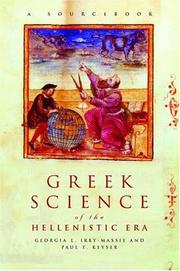
ISBN: 041523848X 0415238471 9780415238472 9780415238489 Year: 2002 Volume: *9 Publisher: London Routledge
Abstract | Keywords | Export | Availability | Bookmark
 Loading...
Loading...Choose an application
- Reference Manager
- EndNote
- RefWorks (Direct export to RefWorks)
Science --- Science, Ancient --- Sciences --- Sciences anciennes --- History --- Sources --- Histoire --- Science, Ancient. --- 509.38 --- Sciences History Ancient World Greece --- Natural science --- Science of science --- Ancient science --- Science, Primitive --- Greece --- Natural sciences --- Sources. --- Science - Greece - History - To 1500.
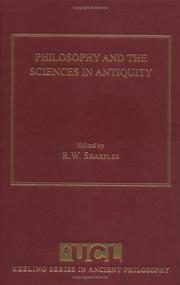
ISBN: 0754651711 9780754651710 Year: 2005 Volume: *2 Publisher: Aldershot: Ashgate,
Abstract | Keywords | Export | Availability | Bookmark
 Loading...
Loading...Choose an application
- Reference Manager
- EndNote
- RefWorks (Direct export to RefWorks)
Philosophy and science --- Philosophy, Ancient --- Science, Ancient --- History --- Greece --- To 1500 --- Congresses --- Philosophy [Ancient ] --- Science [Ancient ] --- Ancient science --- Science, Primitive --- Science --- Science and philosophy --- Philosophy and science - Greece - History - To 1500 - Congresses. --- Philosophy, Ancient - Congresses. --- Science, Ancient - Congresses.

ISBN: 9004100083 9630566451 900445120X 9789004100084 9789004451209 Year: 1994 Volume: 17 Publisher: Leiden Brill
Abstract | Keywords | Export | Availability | Bookmark
 Loading...
Loading...Choose an application
- Reference Manager
- EndNote
- RefWorks (Direct export to RefWorks)
Die Araber und die antike Wissenschaftstheorie discusses the history of the development of Aristotelian argumentation in the Alexandrian neoplatonic school and in Arab philosophy, focussing on the Tabula Porphyriana. It treats the ever present role of specific questions in the Greek and Arab scholarly tradition. In the first part the three problems of the Eisagoge are explored: whether it is, what it is, how it is. The author shows that these questions were interpreted differently by various philosophical schools. The book then discusses another group of issues ( whether it is, what it is, how and why it is ), which determined the argumentation, the axiomatic ordering of the sciences, and concludes with a demonstration on the basis of concrete examples of how the fully-developed argumentation theory was employed in practice.
Science --- Philosophy, Islamic --- Science, Ancient. --- History. --- Islamic philosophy --- -Science --- -Science, Ancient --- Ancient science --- Science, Primitive --- Natural science --- Science of science --- Sciences --- Arabic philosophy --- Muslim philosophy --- Philosophy, Arab --- History --- Science, Ancient --- Science - Islamic Empire - History. --- Philosophy, Islamic - History. --- Islamic Empire
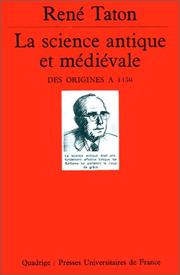
ISBN: 2130447856 9782130447856 Year: 1994 Volume: 173 Publisher: Paris PUF
Abstract | Keywords | Export | Availability | Bookmark
 Loading...
Loading...Choose an application
- Reference Manager
- EndNote
- RefWorks (Direct export to RefWorks)
Science, Ancient --- Science, Medieval --- Sciences anciennes --- Sciences médiévales --- Science, Ancient. --- Science, Medieval. --- S19/0130 --- China: Natural sciences--General works --- Sciences médiévales --- Medieval science --- Ancient science --- Science, Primitive --- Science --- History --- Sciences --- Histoire
| Listing 1 - 10 of 57 | << page >> |
Sort by
|

 Search
Search Feedback
Feedback About UniCat
About UniCat  Help
Help News
News